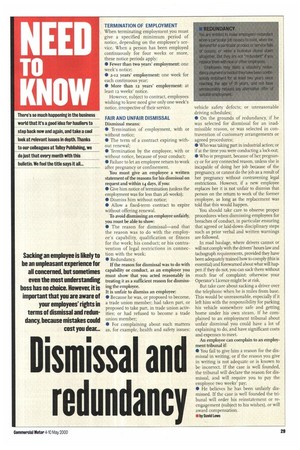TERMINATION OF EMPLOYMENT When terminating employment you must give a
Page 31

If you've noticed an error in this article please click here to report it so we can fix it.
specified minimum period of notice, depending on the employee's service. When a person has been employed continuously for four weeks or more, these notice periods apply:
• Fewer than two years' employment: one week's notice; • 2-12 years' employment: one week for each continuous year;
• More than 12 years' employment: at least 12 weeks' notice.
However, subject to contract, employees wishing to leave need give only one week's notice, irrespective of their service.
FAIR AND UNFAIR DISMISSAL Dismissal means:
• Termination of employment, with or without notice; • The term of a contract expiring without renewal; • Termination by the employee, with or without notice, because of your conduct; • Failure to let an employee return to work after pregnancy or confinement.
You must give an employee a written statement of the reasons for his dismissal on request and within 14 days, if you: • Give him notice of termination (unless the employment was for less than 2.6 weeks); • Dismiss him without notice; • Allow a fixed-term contract to expire without offering renewal.
To avoid dismissing an employee unfairly, you must be able to show: • The reason for dismissal—and that the reason was to do with the employee's capability, qualification or fitness for the work; his conduct; or his contravention of legal restrictions in connection with the work; • Redundancy.
If the reason for dismissal was to do with capability or conduct, as an employer you must show that you acted reasonably in treating it as a sufficient reason for dismissing the employee.
It is unfair to dismiss an employee: • Because he was, or proposed to become, a trade union member; had taken part, or proposed to take part, in trade union activities; or had refused to become a trade union member; • For complaining about such matters as, for example, health and safety issues; vehicle safety defects; or unreasonable driving schedules; • On the grounds of redundancy if he was selected for dismissal for an inadmissible reason, or was selected in contravention of customary arrangements or agreed procedures; • Who was taldrig part in industrial action; or if at the time you were conducting a lock-out; • Who is pregnant, because of her pregnancy or for any connected reason, unless she is incapable of doing her job because of the pregnancy, or cannot do the job as a result of her pregnancy without contravening legal restrictions. However, if a new employee replaces her it is not unfair to dismiss that person on the return to work of the former employee, as long as the replacement was told that this would happen.
You should take care to observe proper procedures when dismissing employees for breaches of conduct, in particular ensuring that agreed or laid-down disciplinary steps such as prior verbal and written warnings are followed.
In road haulage, where drivers cannot or will not comply with the drivers' hours law and tachograph requirements, provided they have been adequately trained how to comply (this is essential) and forewarned about what will happen if they do not, you can sack them without much fear of complaint; otherwise your Operator's Licence might be at risk.
But take care about sacking a driver over the telephone when he is miles from base. This would be unreasonable, especially if it left him with the responsibility for parking his vehicle somewhere safe and getting home under his own steam. If he complained to an employment tribunal about unfair dismissal you could have a lot of explaining to do, and have significant costs and expenses to meet.
An employee can complain to an employment tribunal if: • You fail to give him a reason for the dismissal in writing, or if the reason you give in writing is not adequate or is known to be incorrect. If the case is well founded, the tribunal will declare the reason for dismissal, and will require you to pay the employee two weeks' pay; • He believes he has been unfairly dismissed. If the case is well founded the tribunal will order his reinstatement or reengagement (subject to his wishes), or will award compensation.
• by David Lowe




































































































